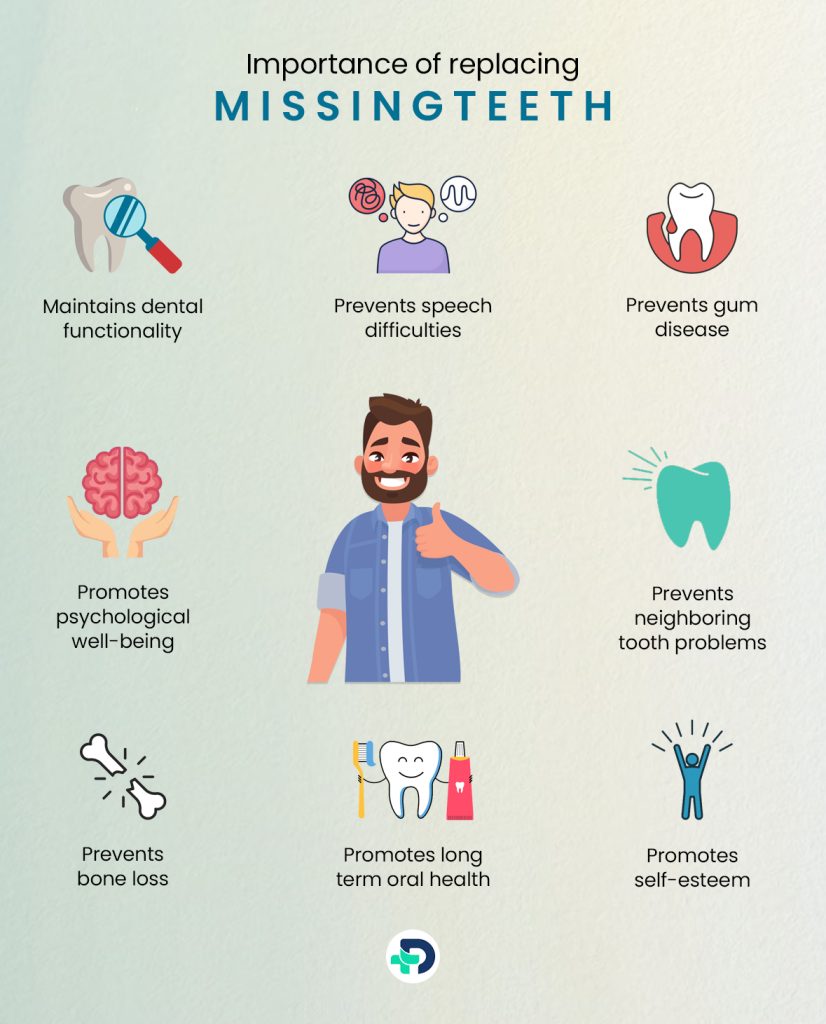Dental Bridge vs Implant? Everything you need to know about!

- Bridges
- 06 Sep 2023
Introduction
Introduction
Modern dentistry has two main procedures that have revolutionized the industry when fixing missing teeth: dental bridges and dental implants. One cannot stress the value of maintaining dental health in addition to aesthetics by restoring a complete and adequate smile. Individuals looking for two replacement choices must choose between bridges and implants as technology progresses. Each choice has particular benefits and things to think about. This extensive article will examine each of its features, advantages, disadvantages, and the variables affecting the decision-making process. By being aware of the subtle differences between each option, you can provide yourself with the information you need to make an informed decision that complements your oral health.

Importance

Importance of replacing missing teeth
- Maintaining dental functionality, bone health, and general well-being depend on replacing lost teeth.
- It prevents problems such as speech difficulties, gum disease, neighboring tooth problems, and loss of bone.
- In addition, it promotes psychological well-being, long-term oral health, and self-esteem.
- Though the apparent spaces created by lost teeth can affect one’s appearance and self-esteem, tooth loss has much more severe effects. 1Importance | Researched based study from The Journal of American Dental Association
Bridges
A Dental Bridge: What is it?
This dental replacement, which is permanent and cannot be removed, is used to replace one or more lost teeth. It restores the look and functioning of the space left by missing teeth or dental implants.
One or more artificial teeth are placed in the bridge and held in place by dental crowns attached to the neighboring natural teeth or dental implants. 1Bridges | Researched based study from The Journal of American Dental Association
Single Tooth Bridge
- A single lost tooth can be replaced with this dental treatment, often called a fixed partial denture.
- It consists of two dental crowns on either side and an artificial tooth to replace the space created by the missing one.
- To firmly secure the Bridge, these crowns are affixed to the teeth in good condition. 1Bridges | Researched based study from The Journal of American Dental Association
Implant
A Dental Implant: What is it?
A tooth root that has been lost is replaced by a titanium post that is surgically placed into the jaw. It is a solid base for attaching a prosthetic tooth, replacing missing teeth with one that looks and functions naturally. 2Implants | Researched based study from National Institutes of Health
Pros & Cons
Pros & Cons
What are the advantages and disadvantages of a dental bridge ?
Pros
- Quick procedure
- Restored chewing ability
- Aesthetic Improvement
- Preservation of tooth alignment
- Noninvasive
- Cost-effective
- Through one technique
Cons
- Adjacent tooth alteration
- Limited lifespan
- Bone health impact
- Maintenance challenges
- Potential aesthetic issues
- Risk of fracture
- Not suitable for all cases
- Future replacement cost
Pros :
Quick procedure
- Comparatively, they can be installed more swiftly than other replacement solutions.
Restored ability to chew
- Bridges help people chew again, which enhances nutrition and overall digestion.
Aesthetic
- They close spaces, making your smile seem better and giving you more confidence.
Tooth positioning
- By keeping adjacent teeth from moving, they aid in maintaining the correct alignment.
Not invasive
- It is a good solution for certain people because it does not require surgery while working.
Cost
- They are frequently less costly compared to other options, such as implants.
Dependable method
- They have a solid track record of dependability and success in dentistry.
Cons :
Adjacent dental changes
- The crown, which can weaken the neighboring healthy teeth, must be prepared to support the Bridge.
Limited lifespan
- They eventually need to be replaced because they usually only last five to fifteen years.
Impact on bone health
- Bridges, in contrast to dental implants, do not promote the process that could eventually result in bone resorption.
Challenges with maintenance
- Increased risk of gum disease and decay from improper cleaning of the area under and around the bridge.
Possible problems with aesthetics
- Time may cause the gum line next to the Bridge to disclose the metal base, which would be unsightly.
Risk of breaking
- They are brittle and easily chipped, especially in places with much bite force.
Unsuitable in all circumstances
- Certain situations, such as those with significant tooth loss or inadequate nearby taste, may not be appropriate.
Subsequent replacement expenses
- They have a finite lifespan. Thus, future replacements may be expensive. 3Pros & Cons | Researched based study from Science Direct
Advantages and Disadvantages of Dental Implants
Pros
- Permanent solution
- Natural look and feel
- Preservation of bone
- Adjacent teeth unaffected
- Enhanced chewing function
- Easy maintenance
- No dietary restrictions
- Improved speech
- High success rate
Cons
- Surgical procedure
- Cost
- Time-consuming process
- Oral health prerequisite
- Potential complications
- Not suitable for everyone
- Initial aesthetic changes
- Risk of gum recession
- Sensitivity
- Maintenance cost
Pros :
Permanent solution
- They are a durable and long-term alternative for replacing teeth.
Natural appearance
- In terms of appearance, texture, and functionality, they are similar to original teeth.
Bone preservation
- It aims to maintain facial structure and stop bone loss.
Teeth adjacent unaffected
- The integrity of nearby healthy teeth is maintained since they are not changed.
Increased capacity for chewing
- Like natural teeth, they have powerful biting and chewing ability.
Easy maintenance
- They can be maintained with routine cleaning and flossing, like conventional teeth.
No dietary restrictions
- Unlike other denture choices, implants let you enjoy your favorite foods guilt-free.
Improve your speech
- They do not slip or impede speech, as sure detachable dentures tend to do.
High rate of success
- Their success rate is tremendous, frequently exceeding 95%. 5Pros & Cons | Researched based study from National Institutes of Health
Cons :
Surgical procedure
- They entail surgery, which can be uncomfortable and take time to recuperate.
Price
- Generally speaking, they cost more upfront than alternative solutions.
Takes a long time
- The healing and osseo integration phases take several months to complete.
Oral requirement
- Sufficient bone mass and healthy gums are prerequisites for a successful implant.
Potential issues
- Though uncommon, infections, nerve injury, and implant failure are possible outcomes.
Not suitable for all
- Specific medical conditions or drugs may impact the eligibility for implants.
Initial aesthetic changes
- There may be a brief change in appearance following implant implantation until the crown is installed.
Sensitivity
- On rare occasions, it may be more susceptible to temperature changes than natural teeth.
Recession risk
- Sometimes the gums around implants recede, revealing the metal abutment.
Maintenance cost
- Despite their extended lifespan, they might eventually require maintenance or repairs. 2Pros & Cons | Researched based study from National Institutes of Health
Choosing the best
Which choice is the best fit for you?
Visiting a dentist
- It is imperative to have comprehensive guidance from an experienced dentist prior to making any decisions.
Individual needs
- Think about how each choice fits your needs and objectives for dental health.
- You may be eligible to have a bridge if you have neighboring healthy teeth. Implants, however, can be a better option if you’re worried about your bone or need a more permanent fix.
- It’s important to consider variables, including the placement, alignment, and quantity of missing teeth.
Lifestyle and maintenance
- Consider your lifestyle and how each choice might affect your daily schedule.
- Think about your aesthetic tastes as well. Implants can give you a more natural-looking appearance, which could be vital for your self-esteem and confidence. 1Choosing the best | Researched based study from The Journal of American Dental Association
Alternatives
Alternatives to Dental Implants
- Dentures
- Dental bridges
- Rays in bonded Bridge
- Removable partial denture
- Orthodontic treatments
- Implant-supported dentures
- Mini dental implants
- Flipper
Dentures
- These are detachable prosthetic devices that can be either full or partial dentures.
Bridge bound by resin
- These bridges use resin or metal wings to link to the rear of neighboring teeth. It is a less invasive choice.
Partially removable dentures
- These are only used in situations where there is a risk of tooth loss. They can be removed for nighttime cleaning.
Treatment for Orthodontics
- This choice might be appropriate for individuals if their bite is incorrectly aligned.
Dentures supported by Implants
- Combine risks associated with dental implants.
Mini Dental Implants
- They are suitable for those with decreased bone mass.
Flipper
- With one or more prosthetic teeth, it’s a temporary removable partial denture made of acrylic. Use of it is typical when waiting for the body to recuperate before choosing a long-term treatment. 4Alternatives | Researched based study from National Institutes of Health
FAQ’s
Frequently Asked Questions
Which is more painful a Bridge or Implant?
Everyone has a unique pain tolerance it can substantially impact how much pain a patient experiences after the procedure.
Bridges: Due to the surrounding teeth being altered, some patients may experience sensitivity or discomfort following the placement of a dental bridge. To make the area numb, local anesthesia is required. Still, it is manageable and subsides rapidly.
Implants: Many individuals describe experiencing pressure instead of pain after undergoing surgical treatment for implants. For a few days following the operation, moderate swelling and mild discomfort are typical. If you take painkillers, it is bearable.
How long does a Tooth Bridge last?
A dental bridge that is kept up properly can endure up to 15 years or longer on average. It depends on the substance used, how well oral hygiene is maintained, the quality of the teeth nearby, how they bite and chew, how often they get dental exams, and how they eat.
Any feedback on this article?
 This Articles content was accurate
This Articles content was accurate Very Informative Article
Very Informative Article I have a question or a comment
I have a question or a comment
 This article contains inaccurate content
This article contains inaccurate content This article was not helpful
This article was not helpful I have a question or a comment
I have a question or a comment
We appreciate your helpful feedback!
Checkout our social pages
References
-
The Journal of American Dental Association
Introduction | Importance | Bridges | Choosing the best The Journal of American Dental Association
-
National Institutes of Health
Implants | Pros and Cons
-
Science Direct
Pros and Cons
-
National Institutes of Health
Alternatives
-
National Institutes of Health
Pros and Cons





































